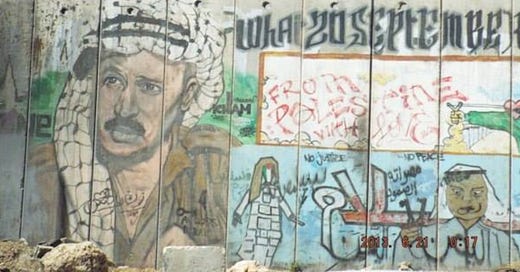I’ve been avoiding my desk. It’s easier to think about Palestine in the abstract. At my desk, trying to make sense of its history, Palestine becomes concrete, visceral, and impossible—which is strange because, in my life, Palestine has never been concrete, not really. It’s been more fable than fact. Until 2013, I had never been to Palestine. Before then, Palestine occupied an inherited longing in my mind and body—it was and sometimes still is a tableau of people and places that I’ve crafted from the stories my family has shared for generations. Stories about the land, the leaving of the land, and the longing to go back.
But my longing has taken on a new shape since October. I long for the footage coming out of Gaza and broader Palestine to make sense, any kind of sense. I long for there to be a decent reaction to the oh-so-not-decent things we watch on Instagram and TikTok. I long for there to be more than a permanent ceasefire. I long for acknowledgment that what’s been happening these last few months as well as these last 75+ years is seriously fucked up. But I’m not sure I’ll ever get that acknowledgment, at least not from the people who have any power to make it stop.
I’ve been thinking a lot about what it means to be Palestinian in the diaspora—who has the right to speak out against these atrocities, who has the right to claim ancestral longing, who has the right to feel the heartbreaking reverberations of displacement. I used to feel like I had to tip-toe around my Palestinianness, for many reasons, but one of them being because I didn’t feel very Palestinian. I grew up in the States and only spoke English in my home, and unlike the majority of Palestinians, I happen to be an Eastern Orthodox Christian. Last time I checked, Christian Palestinians make up less than 2% of all Palestinians in the world. Sometimes I feel like there is a hierarchy of belonging because of these unimportant facts. But I know that whatever the imagined hierarchy is, in the face of an illegal occupation and apartheid, it doesn’t matter.
What matters is what we do with our ancestral inheritance.
A friend recently told me that being in the diaspora and witnessing the genocide in Gaza and broader Palestine is not something to be ashamed of but, rather, it’s something to utilize. I’ve spent a lot of time being ashamed that my circumstances are vastly different from what’s happening in Palestine today and historically. But I’m realizing it’s opportunity—an opportunity to continue to educate, archive, transcribe, and rewrite a history that has not only been dismissed but systematically erased and denied. To be Palestinian in the diaspora today means to carry the torch of our ancestral history, to carry it while on new lands, speaking different languages, and within different communities. It means that we, each of us, are the dominos that will affect and create change.
When I think about dominos I think about my many summers spent at church camp, a camp that consisted mostly of Palestinian families, many of whom were originally from Ramallah. Everyone was a cousin if not by blood at least by marriage—at least that’s what it felt like when I was twelve years old. When I think about dominos I think about sticky afternoons spent sitting on the wooden benches outside of our dining hall. There I’d watch older campers play dominos while I secretly stole any unused pieces. I used to love lining up the pieces and tipping one gently with just enough force to watch the cascade of ivory fall on top of each other in a soothing wave that tick-tick-ticked. Just like those ivory pieces, we in the diaspora can influence a wave of people to care, to fight, to engage with what’s happening in Gaza and broader Palestine.
But I know that it’s not that easy, even with the wave of new folks joining our cause…there’s so much to be done.
These days I’ve been avoiding my desk because I don’t want to face the editorial comments I receive from folks who are evaluating my work for publication. Editors are so good at making it seem as though their comments are for the sake of helping my writing, of fine-tuning it for clarity and succinctness. They tell me that my language has to be “sharpened” or “honed” or “tweaked” for my work to cross the finish line—that statements like “Israel murdered” will have to be stated more neutrally because to claim that Israel has murdered Palestinians sounds, somehow, biased.
These comments are endlessly infuriating. But, again, it’s an opportunity. Pushing against these ridiculous standards and expectations that aim to sanitize our rage, our passion, our truth is the work of the diaspora. In this way, it is a privilege, one I do not take lightly.





I have been thinking about this so much—living in the diaspora and the inherent trauma that comes from that, especially when political situations make the dream of visiting our ancestral homelands impossible. It’s hard for me to put into words the strange paralysis of feeling powerless to do anything about the violence happening thousands of miles away. And sometimes guilty that I escaped what would have been a very different life. (excuse my Sunday morning rambling thoughts and thank you for writing about this! ❤️)